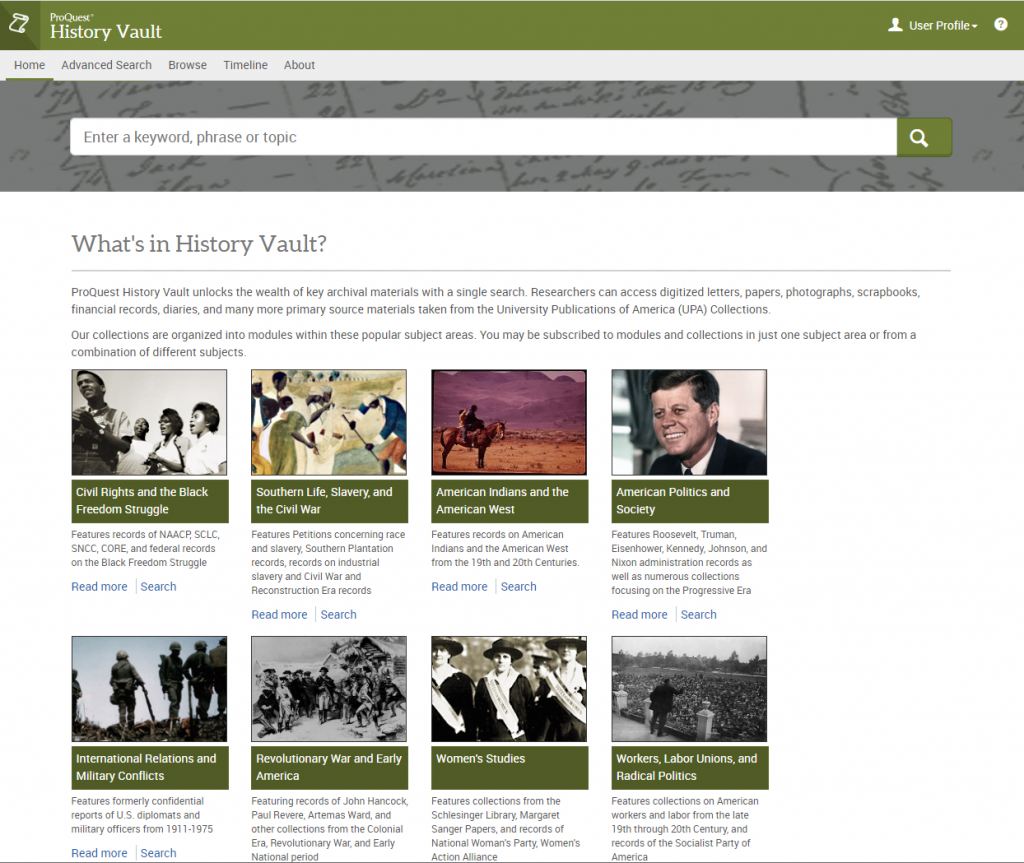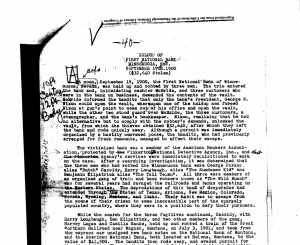Interested in American history? Then ProQuest History Vault may be exactly what you are looking for.
History Vault gives you access to millions of pages of cross-searchable, full-text/full-image documents including articles, correspondence, government records, photographs, scrapbooks, financial records, diaries and more, documenting the most widely studied topics in 18th- through 20th-century American history. It’s a fantastic resource for those teaching, learning or researching in the areas of history, African American studies, women’s studies, political science, social sciences, sociology, and international studies.

You can access ProQuest History Vault via the Databases A-Z list or Digital Primary Source and Archive Collections guide.
History Vault splits it’s collections into 8 themes:
- Civil Rights and the Black Freedom Struggle
- Southern Life, Slavery, and the Civil War
- American Indians and the American West
- American Politics and Society
- International Relations and Military Conflicts
- Women’s Studies
- Workers, Labor Unions, and Radical Politics
These themes contain a huge range of collections, often split into multiple modules, and some highlights include:
NAACP Papers
With a timeline that runs from 1909 to 1972, the NAACP Papers document the realities of segregation in the early 20th century to the triumphs of the passage of the Civil Rights Act of 1964 and the Voting Rights Act of 1965 and beyond.

American Indians and the American West from 1809-1971
This module contains several collections focusing on the interaction between American Indians and the U.S. government in the 19th and 20th Centuries. Notable collections in this module from the 19th Century focus on Indian Removal from 1832-1840, the U.S. Army and American Indians in the years from the 1850s-1890s, including detailed coverage of Indian Wars.
Women at Work during World War II
This collection consists of two major sets of records. First, Records of the Women’s Bureau documents the Bureau as an investigative agency, a clearinghouse for proposed changes in working conditions, and a source of public information. Second, Women in the U.S. Military, Correspondence of the Director of the Women’s Army Corps, 1942-1946 documents the women who served in the Women’s Army Corps. Every topic of importance to the WAC is covered in the correspondence, with an emphasis on issues such as recruiting, personnel matters like discipline and conduct, education, gender roles and race.
Southern Life and African American History, 1775-1915, Plantation Records 1 and 2
These 2 modules document the far-reaching impact of plantations on both the American South and the nation. Plantation records are both business records and personal papers because the plantation was both the business and the home for plantation owners.

Screenshot from FOLDER: 102597 -012-0012 Pinkerton criminal cases: Butch Cassidy and the Wild Bunch Gang bank robberies, First National Bank of Winnemucca
Pinkerton’s National Detective Agency Records, 1853-1999
During its colourful 150-year history, Pinkerton’s National Detective Agency, the oldest company of private investigators in the United States – founded by Allan Pinkerton in the 1850s – pursued some of the nation’s most notorious criminals, like Butch Cassidy and the Sundance Kid, Jesse James, Alfred Brady, John Dillinger and countless others. This fascinating collection, digitized in History Vault from the Library of Congress holdings, includes files on some of the Pinkerton’s most well-known cases. It offers exciting research opportunities in criminology, sociology, the history of law enforcement and labor relations.
Law and Society Since the Civil War
This module consists of 11 collections from the Harvard Law School Library, highlighting three Supreme Court Justices, the first Black federal judge, high-profile cases, and insights into developing ideologies and laws, as far back as 1861 with the Papers of Oliver Wendell Holmes, which span from the Civil War to the Great Depression. The Papers of Louis D. Brandeis and Felix Frankfurter provide a behind-the-scenes view of the Supreme Court between 1919 and 1961. The Frankfurter Papers are of special note because they reveal how the Supreme Court approached the Brown v. Board of Education decision, the landmark school desegregation case that is well documented in other History Vault modules.
Revolutionary War and Early America: Collections from the Massachusetts Historical Society, 1721-1860
The success of the musical Hamilton has led to increased interest in this pivotal period in American history. This module on one of the most-studied periods in American history consists of 26 collections from the holdings of the Massachusetts Historical Society, the first North American historical society and the first library to devote its primary attention to collecting Americana. The collections digitized by ProQuest from the holdings of the Massachusetts Historical Society focus on the Colonial Era, the Revolutionary War and the Early National Period, with some collections extending into the Civil War era.
Labor Unions, and the American Left in the 20th Century
This module consists of a wide range of collections documenting the American workers and labor unions in the 20th century, with a special emphasis on the interaction between workers and the U.S. federal government. The collection opens with Strike Files of the U.S. Department of Justice, as well as records on U.S. government surveillance of radical workers. Materials in this collection provide a view into the evolving policies of intervention in labor disputes and documentation on the major strikes between 1894-1920, as well as a window into the daily operations of private industry during a time of radical social change.
History Vault allows you to cross-search through all collections and modules at one time (which can be a useful way of finding documents in modules you may not have thought to look at) but you can also search or browse the individual modules within each theme.
To get an overview of how you can use History Vault why not watch this video on Researching Women in the Civil Rights Movement Using ProQuest History Vault.
As another example you can watch Researching Social Movements with Primary Sources (ProQuest History Vault) video.
And History Vault is just one platform, the Library has access to a wide and varied range of digital primary source databases that cover complimentary areas (and completely different). The Digital Primary Source and Archive Collections guide allows you to discover all resources available to you.
The Library has access to ProQuest History Vault until 31st July 2024 as part of ProQuest Access 350.
You can access ProQuest History Vault via the Databases A-Z list or Digital Primary Source and Archive Collections guide.
Access is only available to current students and staff at the University of Edinburgh.
Caroline Stirling – Academic Support Librarian for History, Classics and Archaeology
